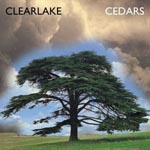|
|
 |
Dusted Reviews
Artist: Clearlake Album: Cedars Label: Domino Review date: Jan. 4, 2004 |

|
|
|
 |
Few, if any new bands facing the critics for the first time get very far without being described as sounding like other artists; in some cases, the comparison is laudatory, while in others, it serves as grounds for accusations of shameless imitation and unoriginality. Britain’s Clearlake are no exception, and their sophomore full-length, Cedars, seems to invite countless comparisons: vocalist Jason Pegg seems to have no fear of resembling any of his forbears and routinely evokes fellow British depressives Morrissey and Thom Yorke, while the band as a whole could be compared at times to just about any noteworthy British rock act from the Beatles onward. Rather than deny their influences, however, Clearlake face them head on, adopting them in such a way that they become devices in a sort of theatrical repertoire rather than defining elements in themselves. As a result, Cedars sounds strikingly familiar without being unabashedly derivative: Clearlake’s own personality as a band shapes all the various musical allusions they make, allowing them to be comfortably referential without sacrificing a definite individual identity.
If any particular motif or aesthetic ties Cedars together, it’s a kind of theatrical creepiness: Pegg’s textbook-neurotic lyrics (certainly to be expected from songs with titles like “The Mind is Evil” and “Can’t Feel a Thing”) recall the divided-self paranoia of canonized crazies like Poe and Dostoyevsky, while their minor-key musical settings are often melodramatic and scary in a carnival-funhouse sort of way. Clearlake shy away from the deadly serious and irony-free “darkness” of acts like Radiohead or Interpol, opting instead to toss a self-consciously knowing wink into the equation. Almost embarrassingly straightforward lines like “I wouldn’t hurt a fly, but I’d really like to punish you,” or “sometimes I think if I killed off my heart and my mind I’d be free” might look laughable on paper, but work perfectly when conveyed with enough emotional exaggeration and creepy bravado. That’s not to say, however, that the fears and doubts that haunt Clearlake’s music are mere jokes; rather, they’re expressions of emotions that doubt their own meaning and validity, rendered all the more potent by the self-consciousness with which they’re conveyed.
Like their lyrics, Clearlake’s music manages to be simultaneously fashionably postmodern and accessibly traditional: “I’d Like to Hurt You” juxtaposes a cold and sparse synth-driven verse with a sing-along-worthy Beatlesesque chorus, while “Come Into the Darkness” fuses the minor-key drone of Black Sabbath and the propulsive and primitive rhythms of Stooges into an elegant arrangement worthy of Pulp or Blur. The band retains the emotional punch present in their influences, but imbues it with a smart and modern sensibility, tying all the loose ends together with impeccably crafted songwriting and production. Clearlake may be neurotic and self-loathing, but they’re damn professional about it.
While Cedars probably won’t appeal to listeners not already immersed in the Britpop canon; it will likely prove rather impressive to those who are. It’s an uncommonly consistent and entertaining album, and manages to sound vital and modern without sacrificing emotional substance at the altar of style. On Cedars’ final track, “Trees in the City,” Clearlake finally seem to make a straightforward attempt at beauty, abandoning the darkness and tension of the rest of the album for a meditation upon the hope offered by beauty amidst ugliness. With gorgeous harmony vocals and a simple gospel-tinged melody, the track works beautifully as a release from all that has gone before: the lyrics turn, perhaps for the first time, away from the mind and into the outside world. Beauty, the track implies, can be found even in the most squalid settings, just as something genuinely personal and new can be created from the inescapable musical detritus of the past.
By Michael Cramer
|







